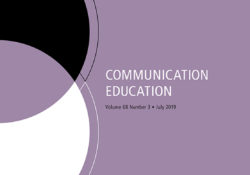tandfonline.com har udgivet en rapport under søgningen “Teacher Education Mathematics”: ABSTRACT ABSTRACT Formation of professional identity is a process where individuals attempt to bring together the social expectations set for them as professionals and their own interests and values. The cultural landscape of engineering is masculine in various ways, which can be challenging especially for female engineers who need to match the cultural expectations with their personal identities. So far, few studies have compared the professional identities of early-career men and women engineers. This study aims to understand the professional identities of newly graduated Finnish male and female engineers by analysing their perceptions of the importance and development of professional engineering skills. An analysis of cross-sectional survey data of more than 4000 early-career engineers suggests some gender differences related to… Continue Reading →
Like this:
Like Loading...
tandfonline.com har udgivet en rapport under søgningen “Teacher Education Mathematics”: ABSTRACT Formulae display:?Mathematical formulae have been encoded as MathML and are displayed in this HTML version using MathJax in order to improve their display. Uncheck the box to turn MathJax off. This feature requires Javascript. Click on a formula to zoom. ABSTRACT In times of rapid transformation of society in general and domains of technology in particular, questions are raised on how to effectively organise higher engineering education. As a response, this study examines the curriculum composition of eleven engineering programs to investigate curriculum nativeness, a novel approach for assessing curriculum characteristics. In addition to forming the construct nativeness, this study establishes a way to measure curriculum nativeness by determining the number of credits originating from what is characterised as… Continue Reading →
Like this:
Like Loading...
tandfonline.com har udgivet en rapport under søgningen “Teacher Education Mathematics”: ABSTRACT ABSTRACT This study explores how project-based learning in combination with other pedagogical scaffolding approaches influences students’ experiences during their transition into the university. Based on the thematic analysis of interviews with students at the end of the first semester, we show how a project-based course in electronics can create opportunities within three themes: student socialisation, curriculum integration, and peer-learning. In the light of these findings, we discuss how students build relationships with other students, as well as with faculty members and practicing engineers, and how these relationships influence their start at the university. On a more general level, this case study exemplifies how an existing electrical engineering programme can be changed by targeted interventions without the need for programme… Continue Reading →
Like this:
Like Loading...

tandfonline.com har udgivet en rapport under søgningen “Teacher Education Mathematics”: ABSTRACT ABSTRACT We assessed the effectiveness of an integrated engineering public-speaking class relative to a traditionally taught public-speaking class. The integrated class was designed to meet the growing science, technology, engineering, and mathematics communication needs and the fundamental Accreditation Board for Engineering and Technology and the National Communication Association student outcomes related to public speaking. Working within the Communication in the Disciplines theoretical framework, this study employed a quasi-experiment with both a test (engineering specific communication class) and control (traditional communication class) group; finding a significant increase with respect to attitude toward communication for students before and after the engineering specific class compared with the traditional class. Along with attitude toward communication, efficacy toward communication and being enrolled in the… Continue Reading →
Like this:
Like Loading...



